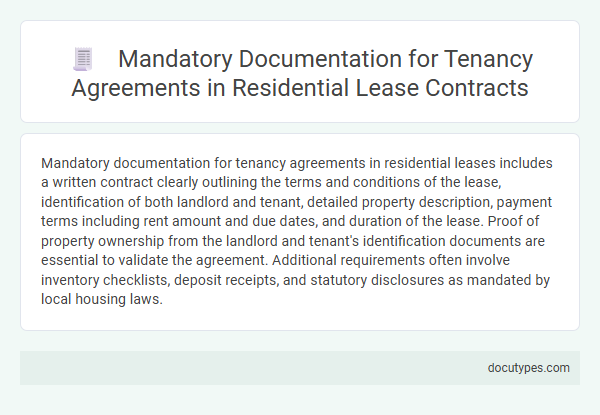Mandatory documentation for tenancy agreements in residential leases includes a written contract clearly outlining the terms and conditions of the lease, identification of both landlord and tenant, detailed property description, payment terms including rent amount and due dates, and duration of the lease. Proof of property ownership from the landlord and tenant's identification documents are essential to validate the agreement. Additional requirements often involve inventory checklists, deposit receipts, and statutory disclosures as mandated by local housing laws.
Introduction to Mandatory Documentation in Tenancy Agreements
What is the mandatory documentation required for tenancy agreements in residential leases? Mandatory documentation ensures clarity and legal compliance between landlords and tenants. You must provide these documents to establish clear terms and protect both parties throughout the lease duration.
Importance of Proper Documentation in Residential Leases
Proper documentation is essential for establishing clear terms and protecting the rights of both landlords and tenants in residential leases. Mandatory documents ensure legal compliance and prevent potential disputes throughout the tenancy period.
- Tenancy Agreement - A written contract outlining the terms, responsibilities, and conditions agreed upon by both parties.
- Inventory and Condition Report - A detailed record of the property's state at the start of the lease to avoid misunderstandings regarding damages.
- Proof of Identity and Eligibility - Verification documents confirming tenant identity and legal eligibility to rent, safeguarding against fraud.
Tenant Identification and Verification Documents
Mandatory documentation for tenancy agreements in residential leases primarily includes tenant identification and verification documents. These documents are essential to confirm the identity and legal status of the tenant entering the lease.
The most commonly required identification includes a government-issued photo ID such as a passport or driver's license. Proof of address and employment details may also be requested to verify tenant eligibility and ensure secure leasing practices for your protection.
Landlord Proof of Ownership and Authorization
Mandatory documentation for tenancy agreements in residential leases includes proof of the landlord's ownership of the property. This proof typically consists of title deeds, property tax receipts, or official ownership certificates. Authorization documents may also be required if a representative or property manager is signing on behalf of the landlord.
Detailed Property Description and Inventory List
The mandatory documentation for tenancy agreements in residential leases includes a detailed property description and a comprehensive inventory list. These documents ensure clear communication between landlords and tenants regarding the condition and contents of the leased property.
- Detailed Property Description - Specifies the exact address, layout, and features of the residential property to avoid misunderstandings.
- Inventory List - Itemizes all furniture, appliances, and fixtures present at the start of the tenancy to document their condition.
- Condition Report - Records the state of each item and area within the property at move-in to protect both parties against future disputes.
Providing accurate and thorough documentation aids in maintaining transparency and legal compliance throughout the tenancy.
Rent Payment Terms and Security Deposit Receipts
Mandatory documentation for tenancy agreements in residential leases includes clear rent payment terms and security deposit receipts. These documents outline the payment schedule, amount, and acceptable methods for rent, ensuring transparency.
Your security deposit receipt must detail the deposit amount, the conditions for its return, and any deductions. Providing these receipts protects both tenants and landlords under the law.
Governmental and Legal Compliance Certificates
Mandatory documentation for tenancy agreements in residential leases ensures compliance with government regulations and legal standards. These documents protect both landlords and tenants by confirming the lease adheres to all required safety and legal protocols.
- Gas Safety Certificate - This certificate confirms that all gas appliances and installations have been inspected and are safe for use throughout the tenancy.
- Energy Performance Certificate (EPC) - The EPC provides a rating of the property's energy efficiency, which must be valid and available to tenants before the lease begins.
- Deposit Protection Certificate - Landlords must provide this certificate to demonstrate the tenant's deposit is securely held in a government-approved tenancy deposit scheme.
Duration, Renewal, and Termination Clauses
Mandatory documentation for tenancy agreements in residential leases must clearly specify the duration of the lease, ensuring both parties understand the start and end dates. Renewal clauses should detail the conditions under which the lease can be extended, including notice periods and any changes in terms. Termination clauses must outline the rights and responsibilities of both landlord and tenant, including notice requirements and grounds for early termination to protect your interests.
Essential Signatures and Witness Requirements
Mandatory documentation for tenancy agreements in residential leases includes the signed lease contract, which outlines the terms and conditions agreed upon by both parties. Essential signatures are required from the tenant and landlord to validate the agreement.
Witness requirements vary by jurisdiction but often include at least one impartial witness who must sign the agreement to confirm its authenticity. The witness serves to verify that You and the landlord entered the agreement willingly and with full understanding. Proper execution of signatures and witnessing safeguards the legal enforceability of the tenancy agreement.
What is the Mandatory Documentation for Tenancy Agreements in Residential Leases? Infographic

